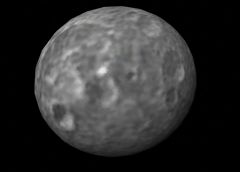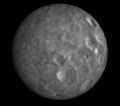| Io
|

|
| Proteus in Orbiter 2016 with D3D9 client
|
| Designation
|
| Name |
Proteus
|
| Reference body |
Neptune
|
| Planetary mean orbits
|
| Epoch |
2006.49555099247 (2006 June 30)
|
| Semimajor axis (a) |
117646138.8 m
|
| Eccentricity (e) |
0..000721043486568402
|
| Inclination (i) |
29.03364224°
(0.50673265090984 radian)
|
| Longitude of the ascending node (LAN, ☊) |
50.67821102°
(0.844501641369886 radian)
|
| Longitude of periapsis (ϖ) |
247.9521324°
(4.32758109853377 radian)
|
| Mean longitude (L) |
275.122144°
(4.80178725780075 radian)
|
| Selected physical parameters
|
| Mean radius |
200000 m
|
| Mass |
2.346×1019 kg
|
| Note |
*Elements given are from Proteus.cfg (Orbiter 2016)
|



